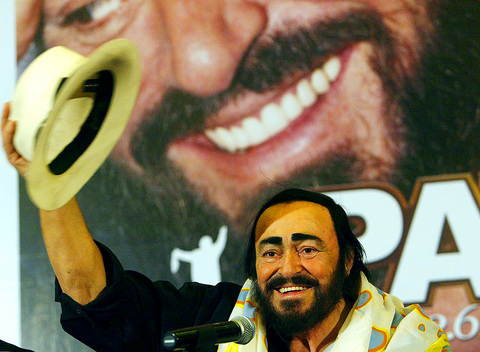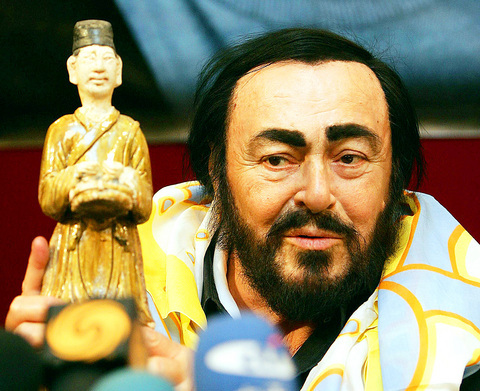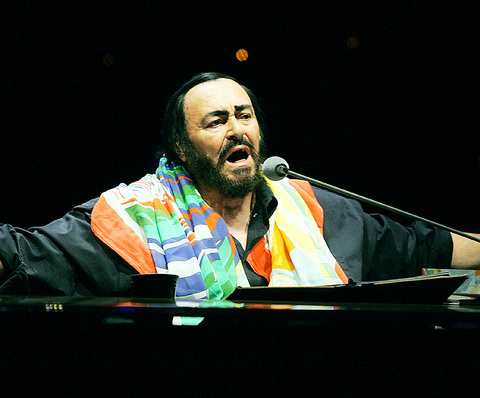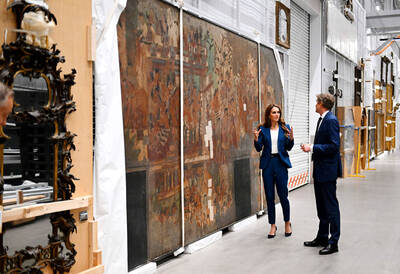In what must be the worst quality recording you've ever heard on CD, Lucia di Lammermoor, recorded live in Turin in 1967 and issued by an obscure German record label, gets under way. After 15 minutes Edgardo enters, in love with an aristocratic woman about to be subjected to a forced marriage who loves him in return.
The young Renata Scotto as the woman, Lucia, is remarkable enough, but she is now joined by someone to match her. It's the young tenor Luciano Pavarotti, aged 32 and possessing a voice that only appears a few times in a century, the classic, wine-glass-breaking, heart-breaking Italian-style tenor.
The recorded sound quickly improves, uncovering a performance of heroic magnificence. Pavarotti's voice is supremely fine, ringing in the higher register, rounded and pure in the lower. The opera, full of echoes of Hamlet (the most influential text on European Romanticism) and based, as so many operas of the period were, on a novel by the Scottish novelist Walter Scott, careers to its tragic conclusion. But Pavarotti was all set to go on to a career that would dominate the next 40 years.

PHOTOS: AP
Most people will know him as one of the "Three Tenors," and it's true he is equaled in fame by Placido Domingo and Jose Carreras. Carreras is the more romantic figure and Domingo, in roles such as Otello, the greater tragic actor. Pavarotti on stage, as for instance in Franco Zeffirelli's Don Carlos or in the Metropolitan Opera's L'Elisir d'Amore, both of 1992, appears too innocent to be a dramatic character. He's always, you feel, simply himself, smiling his cherubic smile in some outlandish historical costume. Actors are deceivers, and so they can't be innocents. But Pavarotti is innocence personified, laughing with undisguisable joy as audiences cheer after every concert number and waving his voluminous white handkerchief as if signaling to his mother that he's there and it's time for someone to come along and take him home to bed.
Pavarotti is the most lovable of all the great tenors now passing into history. And if you watch the Three Tenors concert held outdoors in Paris in 1998, you will notice that not only is he the last to appear (something his management probably insisted on), but also that he's the one who gets all the best items to sing.
In a sense he was born too late. The great age of operatic tenors was before electricity allowed all voices to be amplified at the turn of a knob. Then their sheer volume permitted large audiences to hear them and large profits to be made by theater managements. But Pavarotti has never been merely loud, as anyone who watches the DVD of him on the stage of New York's Metropolitan Opera, with James Levine at the piano, in their recital of 1996 will immediately recognize.

Here there are no crowd-pleasing antics, but instead true artistry. He sings enough operatic rarities to please any connoisseur and everywhere displays himself as a discriminating musician, albeit one with heroic powers.
What does it matter who gives permission for his private jet to land next week at Taichung's airport or that the city's mayor appears in costume in the TV ad for the concert? Luciano Pavarotti is a great presence on the world stage. When some years ago he told China's leaders he didn't like Chinese opera, only the Italian kind, he was being what he is naturally -- innocent, honest, simple and, because of these very qualities, at his best incredibly moving.
What Pavarotti's voice will prove to be like now he's 70 years old is in some senses irrelevant. He's one of the genuinely great, a living treasure. And however much we may smile at him at times, old showman that he is, we ought to love him as well. The world will be poorer when he's gone.

Look again at that Paris Three Tenors DVD, and notice how at the end Pavarotti shows himself as, in the best possible sense, the eternal child. When the crowd is roaring in front of them and the others are clutching their bouquets and clapping back, he can be observed turning away from it all, innocent that he is, looking backwards over his shoulder, and watching the fireworks.
Performance notes:
Luciano Pavarotti's Farewell World Tour (帕華洛帝世界巡迴告別演唱會) is at Taichung Stadium (台中體育場), 271, Lixing Rd, Taichung City (台中市力行路271號), on Wednesday, Dec. 14. Tickets were still available at the time of writing at NT$1,500, NT$2,000, NT$3,000 and NT$5,000, from ERA outlets.

One of the most important gripes that Taiwanese have about the Democratic Progressive Party (DPP) is that it has failed to deliver concretely on higher wages, housing prices and other bread-and-butter issues. The parallel complaint is that the DPP cares only about glamor issues, such as removing markers of Chinese Nationalist Party (KMT) colonialism by renaming them, or what the KMT codes as “de-Sinification.” Once again, as a critical election looms, the DPP is presenting evidence for that charge. The KMT was quick to jump on the recent proposal of the Ministry of the Interior (MOI) to rename roads that symbolize

On the evening of June 1, Control Yuan Secretary-General Lee Chun-yi (李俊俋) apologized and resigned in disgrace. His crime was instructing his driver to use a Control Yuan vehicle to transport his dog to a pet grooming salon. The Control Yuan is the government branch that investigates, audits and impeaches government officials for, among other things, misuse of government funds, so his misuse of a government vehicle was highly inappropriate. If this story were told to anyone living in the golden era of swaggering gangsters, flashy nouveau riche businessmen, and corrupt “black gold” politics of the 1980s and 1990s, they would have laughed.

It was just before 6am on a sunny November morning and I could hardly contain my excitement as I arrived at the wharf where I would catch the boat to one of Penghu’s most difficult-to-access islands, a trip that had been on my list for nearly a decade. Little did I know, my dream would soon be crushed. Unsure about which boat was heading to Huayu (花嶼), I found someone who appeared to be a local and asked if this was the right place to wait. “Oh, the boat to Huayu’s been canceled today,” she told me. I couldn’t believe my ears. Surely,

Imagine being able to visit a museum and examine up close thousand-year-old pottery, revel alone in jewelry from centuries past, or peer inside a Versace bag. Now London’s V&A has launched a revolutionary new exhibition space, where visitors can choose from some 250,000 objects, order something they want to spend time looking at and have it delivered to a room for a private viewing. Most museums have thousands of precious and historic items hidden away in their stores, which the public never gets to see or enjoy. But the V&A Storehouse, which opened on May 31 in a converted warehouse, has come up